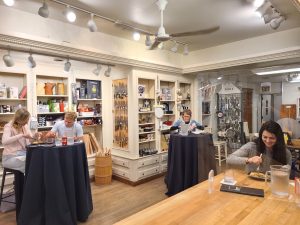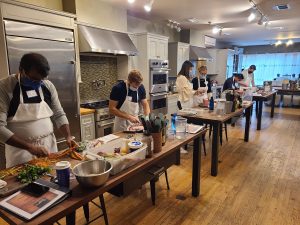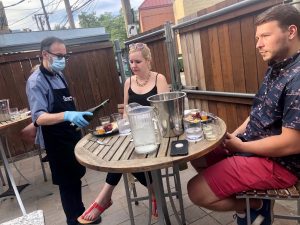The Chopping Block Goes Online from Chicago
By Lorrie Baumann
When Shelley Young opened The Chopping Block 24 years ago in Chicago, Illinois, she envisioned her business as a recreational cooking school with a sideline in antiques sales. “I didn’t carry any retail other than the antiques,” she said. “It didn’t go over well with the customers that I didn’t have the products they needed.”
 Young dealt with her customers’ frustration when they couldn’t find the equipment or the uncommon ingredients to duplicate a dish they’d learned to make in cooking classes by stocking the essentials: cookware from Le Creuset and Lodge, Emile Henry bakeware and Shun and Global knives. “Our retail line has been built very strategically over the years and continues to ebb and flow and adapt considerably,” she said. “We’ll grow a category for some years, and that will wane.”
Young dealt with her customers’ frustration when they couldn’t find the equipment or the uncommon ingredients to duplicate a dish they’d learned to make in cooking classes by stocking the essentials: cookware from Le Creuset and Lodge, Emile Henry bakeware and Shun and Global knives. “Our retail line has been built very strategically over the years and continues to ebb and flow and adapt considerably,” she said. “We’ll grow a category for some years, and that will wane.”
“We carry tools rather than gadgets. If you have somebody in your life – man or woman – who is an avid car person or a woodworker, you go into their workshop, and what’s in there are tools,” she added. “I want tools…. My strategy has always been that we focus on the honest sale. I want to get things in people’s hands that serve them, that last, and 20 years later, when they pull it out of the drawer, they’ll think, I still have it. It still works…. We’re loyal to our customers. We’re loyal to our vendors. We don’t bounce around a lot. Our stories are really told through our teaching.”
A well-equipped kitchen contains a variety of tools – many might be used almost every day, and some are specialized items that may be used only occasionally. Young advises her customers to take the frequency with which they’ll plan to use an item into account when they decide how much they want to pay for it. “We do carry different price points,” she said. “That investment might be hard to swallow for something that isn’t used very often.”
 Before the pandemic curbed in-person classes at the recreational cooking school, The Chopping Block regularly held 400 classes and events over the course of a month. Young finds that many of the customers that have taken her cooking classes have given so little thought to assembling the proper equipment for a functioning kitchen that they don’t have the basics. With the pandemic keeping them at home and in their kitchens more often, some of them are discovering that they need to think more about the quality of their tools, she said. “Thermometers are a big category for us. They’re critical to teaching virtual classes,” she said. “Many people don’t have a good peeler, a good grater. They don’t even own a whisk. They don’t have a sharp knife or good cutting board. Your chopping block is your work surface – if you are lucky to have a big kitchen, get a big chopping block. Those are some of the tools that I think are super-essential, and most people don’t have good ones.”
Before the pandemic curbed in-person classes at the recreational cooking school, The Chopping Block regularly held 400 classes and events over the course of a month. Young finds that many of the customers that have taken her cooking classes have given so little thought to assembling the proper equipment for a functioning kitchen that they don’t have the basics. With the pandemic keeping them at home and in their kitchens more often, some of them are discovering that they need to think more about the quality of their tools, she said. “Thermometers are a big category for us. They’re critical to teaching virtual classes,” she said. “Many people don’t have a good peeler, a good grater. They don’t even own a whisk. They don’t have a sharp knife or good cutting board. Your chopping block is your work surface – if you are lucky to have a big kitchen, get a big chopping block. Those are some of the tools that I think are super-essential, and most people don’t have good ones.”
Under the influence of the COVID-19 pandemic, physical objects – other than The Chopping Block’s inventory of wine and spirits, which is an important contributor to the business’ revenue – abruptly became a marginalized component of the revenue stream. Young doesn’t do any online kitchenware business – if customers aren’t able to come into her stores, she’s happy to refer them to other retailers to meet their kitchen equipment needs. “Le Creuset sells directly now to consumers and through other large retailers,” she said. “It makes it difficult to position yourself as something different from anyone else.”
The Chopping Block’s two retail locations – one in Chicago’s Merchandise Mart and the other in the city’s Lincoln Square neighborhood – have been intermittently forced to close in observance of pandemic restrictions, although the Lincoln Square location was allowed to continue curbside service during partial shutdowns. While the shutdowns slammed the brakes on in-person classes for local recreational cooks, The Chopping Block’s cooking school is still going strong in cyberspace.
 Young jump-started her business’ move to online instruction by reaching out to local nonprofit organizations whose plans for fundraising events had also been thrown into disarray. I thought, What are our not-for-profit friends going to do? How are they going to have events and make money? she asked herself in those early days when Chicago’s public health authorities ordered everyone not engaged in essential activities to stay home. Young responded by reaching out to local non-profits to ask those questions and to offer help. “We’re working on new relationships with them, trying to reach out to support them, which also supports us,” Young said. “We sometimes do a class and have an option to make a donation to the charity. We have collaborated in ways that have benefited us both. We’ve developed some new relationships, and that’s rewarding as well. It’s nice to find people that you can commiserate with and feel like you’re championing them and find ways to get through this together.”
Young jump-started her business’ move to online instruction by reaching out to local nonprofit organizations whose plans for fundraising events had also been thrown into disarray. I thought, What are our not-for-profit friends going to do? How are they going to have events and make money? she asked herself in those early days when Chicago’s public health authorities ordered everyone not engaged in essential activities to stay home. Young responded by reaching out to local non-profits to ask those questions and to offer help. “We’re working on new relationships with them, trying to reach out to support them, which also supports us,” Young said. “We sometimes do a class and have an option to make a donation to the charity. We have collaborated in ways that have benefited us both. We’ve developed some new relationships, and that’s rewarding as well. It’s nice to find people that you can commiserate with and feel like you’re championing them and find ways to get through this together.”
Young’s next step was to reach out to for-profit businesses headquartered in Chicago but perhaps with branch offices and remote workers around the country and even around the world. She’s able to sell corporations on the idea that her virtual cooking events provide opportunities for team-building, for camaraderie and morale-building between employees and even for entertaining clients. “I wasn’t really aware of how giant the virtual conference industry was before COVID,” Young said. “We’re now part of virtual conferences as entertainment or breaks and international conferences with departments that want break-out sessions.”
As Young’s team works with corporate executives to bid for their online events, it’s critical that they stress that her instructors have decades of experience with professional cooking and restaurant kitchen management that they call upon to enrich the students’ experience and that her company’s collective experience can guarantee that her clients’ events will provide rewarding experiences for them and their employees. “When we’re talking to our clients, it’s partly because of our years of experience. We’ve done over 100 virtual events already. We are very serious about that business, and we respond professionally, so we make our clients look really good,” she said. “If you’re going to put together an international conference with your executives around the world, you want a professional organization. You want a party; you want to look at a menu; we do the rest. We moderate it. We teach it. We’re a one-stop shop.”
 One challenge that comes up frequently is that the client who’s considering a virtual cooking event is often someone who’s interested in cooking in his or her own kitchen, and those folks sometimes have difficulty scaling down their ambitions to a menu that their less accomplished colleagues will be able to achieve without becoming overwhelmed. That’s an issue that has to be addressed directly, Young said. “In private events, when an event might be for entertainment, the client might want an elaborate menu, but the guests might not have the capabilities,” she said. “We’re learning how to manage the host’s expectations with the experience of the guests.”
One challenge that comes up frequently is that the client who’s considering a virtual cooking event is often someone who’s interested in cooking in his or her own kitchen, and those folks sometimes have difficulty scaling down their ambitions to a menu that their less accomplished colleagues will be able to achieve without becoming overwhelmed. That’s an issue that has to be addressed directly, Young said. “In private events, when an event might be for entertainment, the client might want an elaborate menu, but the guests might not have the capabilities,” she said. “We’re learning how to manage the host’s expectations with the experience of the guests.”
Pricing for the classes is another sticky issue. “It’s hard for people to understand the value. A private event takes a minimum of four-and-a-half or five hours for the chef’s time. This is not an inexpensive venture,” she said. “Every one of our events is taught by a professional chef. We deliver high-end quality events in terms of skill, professionalism and experience teaching.”
 Once the worst effects of the pandemic are behind her, Young is confident that its lessons will remain with her and that her business will continue in the direction in which the pandemic has steered it, both in terms of how she runs The Chopping Block and how other companies will use her company’s services to support their own businesses. “There’s been some great success with organizations that have chapters around the country. Virtual is a wonderful way to do time-efficient things to support an organization,” she said. “I think these will be used on many different levels, making it possible for remote workers to feel more connected than they ever did before because now we’re all on Zoom together.”
Once the worst effects of the pandemic are behind her, Young is confident that its lessons will remain with her and that her business will continue in the direction in which the pandemic has steered it, both in terms of how she runs The Chopping Block and how other companies will use her company’s services to support their own businesses. “There’s been some great success with organizations that have chapters around the country. Virtual is a wonderful way to do time-efficient things to support an organization,” she said. “I think these will be used on many different levels, making it possible for remote workers to feel more connected than they ever did before because now we’re all on Zoom together.”
“You’re so much more on task when you’re on Zoom; you can’t stop for a sandwich during Zoom, which you might do during an all-day conference,” she added. “I’m trying to filter through all that’s happening now and look for all the gold, and I’m going to grow that part.”

You must be logged in to post a comment.